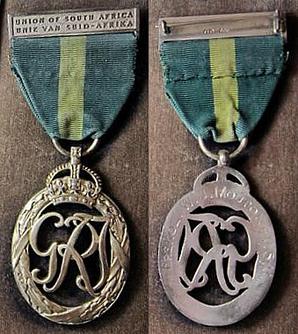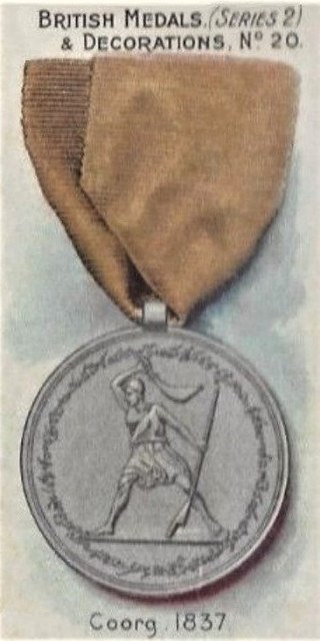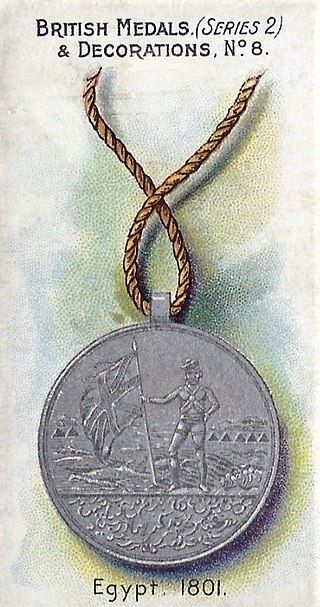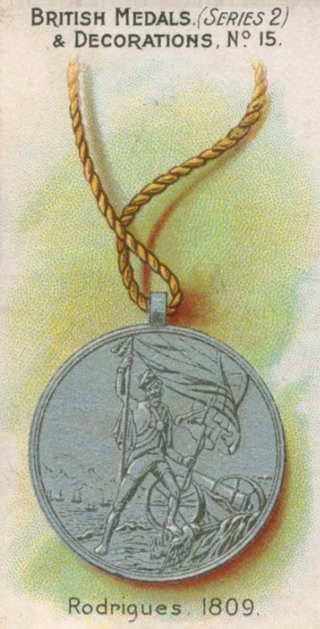
The India General Service Medal was a campaign medal approved on 1 March 1854, for issue to officers and men of the British and Indian armies. It was awarded for various minor military campaigns in India and nearby countries, between 1852 and 1895.

The Army of India Medal (AIM) was a campaign medal approved in 1851 for issue to officers and men of the British Army and the Army of the Honourable East India Company. A retrospective award following the precedent set by the Naval General Service Medal and the Military General Service Medal, it served to reward service in various actions from 1803 to 1826.

The Efficiency Decoration (South Africa), post-nominal letters ED, was instituted in 1930 for award to efficient and thoroughly capable part-time officers in the Citizen Force of the Union of South Africa after twenty years of service. The decoration superseded the Colonial Auxiliary Forces Officers' Decoration.

The Seringapatam Medal, or Sri Ranga Pattanam Medal, is a campaign medal that was awarded by the Governor-General of India to all British and Indian soldiers who participated in the British victory in the Battle of Seringapatam in 1799.

The Colonial Auxiliary Forces Officers' Decoration, post-nominal letters VD, was established in 1899 as recognition for long and meritorious service as a part-time commissioned officer in any of the organized military forces of the British Colonies, Dependencies and Protectorates. It superseded the Volunteer Officers' Decoration for India and the Colonies in all these territories, but not in the Indian Empire.

The Central Africa Medal was a British campaign medal awarded for service from 1891 to 1894 in Eastern and Central Africa, and from 1894 to 1898 for service in British Central Africa.

The Indian Meritorious Service Medal (for Europeans of Indian Army) was a medal to recognize long and meritorious service by European non-commissioned officers in service of the East India Company's Army.

The Indian Long Service and Good Conduct Medal (for Europeans of Indian Army) was a medal to recognize long and efficient service by Europeans in service of the East India Company's Army.

The Indian Long Service and Good Conduct Medal was a long service medal awarded to Indian other ranks in the British Indian Army.

The Volunteer Long Service Medal was instituted in 1894 as an award for long service by other ranks and some officers of the United Kingdom's Volunteer Force. Award of the medal was discontinued when it was superseded by the Territorial Force Efficiency Medal in 1908.

The Volunteer Long Service Medal was instituted in 1894 as an award for long service by other ranks and some officers of the United Kingdom's Volunteer Force. In 1896, the grant of the medal was extended to other ranks and officers who had served in the ranks of the Volunteer Forces throughout the British Empire. A separate new medal was instituted, the Volunteer Long Service Medal for India and the Colonies. Awarding of this medal was discontinued in stages when it was superseded in most territories by the Colonial Auxiliary Forces Long Service Medal in 1899 and in the remainder by the Efficiency Medal in 1930.

The Capture of Ceylon Medal is a campaign medal that was awarded by the Governor-General of India to soldiers in Bengal artillery units of the armies of the East India Company (EIC) who took part in the capture of Ceylon in 1795–96.

The Java Medal is a campaign medal awarded by the Governor-General of India to soldiers of the armies of the Honourable East India Company (HEIC) who participated in the Invasion of Java in August and September 1811, during the Napoleonic Wars.

The Nepal Medal was awarded by the Honourable East India Company (HEIC) to native Indian officers, and Indian soldiers for particularly distinguished conduct, during the Anglo-Nepalese War of 1814–16.

The Burma Medal is a campaign medal awarded by the Governor-General of India to native Indian soldiers of the armies of the Honourable East India Company (HEIC) who participated in the First Burma War from April 1824 to February 1826.

The Coorg Medal was awarded by the Honourable East India Company (HEIC) to local forces who remained loyal during the Coorg rebellion of 1837.

The Mysore Medal is a campaign medal that was awarded by the Governor-General of India to native Indian soldiers of the armies of the Honourable East India Company (HEIC) who participated in the Third Anglo-Mysore War of 1790 to 1792.

The Deccan Medal was the first campaign medal instituted by the East India Company (EIC). It was awarded to native Indian troops who took part in the major campaigns in India between 1778 and 1784. It is sometimes referred to as the Carnatic Medal.

The Egypt Medal is a campaign medal that was awarded by the Governor-General of India to members of the expeditionary force that travelled from India to take part in the 1801 Egyptian campaign, a part of the French Revolutionary Wars.

The Medal for the capture of Rodrigues, Isle of Bourbon and Isle of France is a campaign medal that was awarded by the Governor-General of India to native Indian soldiers of the East India Company (EIC), who took part in the capture of these three Indian Ocean islands from French forces between July 1809 and December 1810.




















